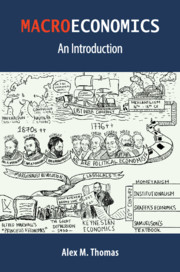Book contents
- Frontmatter
- Dedication
- Contents
- List of Illustrations
- List of Figures
- List of Tables
- Preface
- Acknowledgements
- Note to the Reader
- 1 What is Economics
- 2 Conceptualising the Macroeconomy
- 3 Money and Interest Rates
- 4 Output and Employment Levels
- 5 Economic Growth
- 6 Why Economic Theory Matters
- 7 The Policy Objective of Full Employment
- 8 The Policy Objective of Low Inflation
- 9 Towards Good Economics
- Data Sources
- References
- Index
9 - Towards Good Economics
Published online by Cambridge University Press: 08 June 2021
- Frontmatter
- Dedication
- Contents
- List of Illustrations
- List of Figures
- List of Tables
- Preface
- Acknowledgements
- Note to the Reader
- 1 What is Economics
- 2 Conceptualising the Macroeconomy
- 3 Money and Interest Rates
- 4 Output and Employment Levels
- 5 Economic Growth
- 6 Why Economic Theory Matters
- 7 The Policy Objective of Full Employment
- 8 The Policy Objective of Low Inflation
- 9 Towards Good Economics
- Data Sources
- References
- Index
Summary
This short chapter, written in lieu of a conclusion, is also intended to serve as a prologue to your further study of economics. First, I outline the approach to macroeconomics adopted in this book by highlighting the key issues addressed in each chapter. Then, I assemble the theories endorsed in this book along with some instances of how the concept (or theory) was employed to make sense of the Indian macroeconomic context. I end by highlighting the importance of pluralism (of theory and method) in the study of economics.
An introduction to macroeconomics
I had strongly remarked in the preface to this book that no textbook, including this, ought to substitute for the reading and studying of classic books and articles in economics. As a consequence, this book can only, and should always, remain an introduction to macroeconomics. The approach followed here has been unconventional insofar as it has critically engaged with two major schools of thought found in economics. Although textbooks usually communicate a settled body of knowledge, in this book, I have adopted an ‘unsettling approach’, as it were. Moreover, as stated in the preface, my preference has been to adopt a problem-setting approach than a problem-solving one, as is commonplace among contemporary economics textbooks.
Chapter 1 took you through a very swift tour of the history of economic thought. A sample of key definitions of economics by Smith, Ricardo, Jevons, Marshall and Robbins was then provided, and we adopted the ‘science of wealth’ definition. In the epilogue to The Science of Wealth: Adam Smith and the Framing of Political Economy (2009), Tony Aspromourgos offers the following judgement of Smith's political economy: “The classical political economy which Smith first fashioned into a satisfying general system of inquiry or science remains in broad terms a sound approach to the analysis of mixed capitalistic economies, centred on the dynamics of economic development” (p. 270; emphasis added). Indeed, it is precisely this approach that has been adopted in this book. Subsequently, the relationship between politics and economic phenomena was highlighted. In the last section, the approach adopted in the book was made explicit: a ‘macro’ level analysis of a competitive economy.
- Type
- Chapter
- Information
- MacroeconomicsAn Introduction, pp. 186 - 197Publisher: Cambridge University PressPrint publication year: 2021



